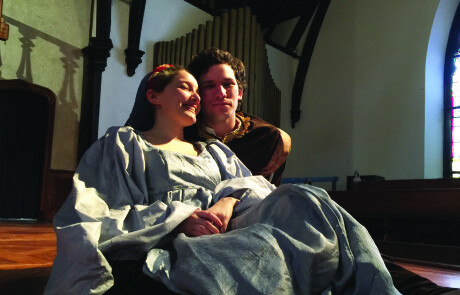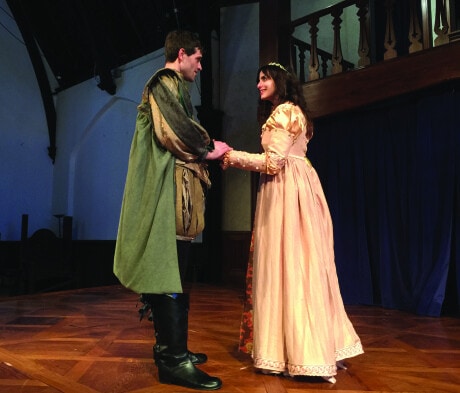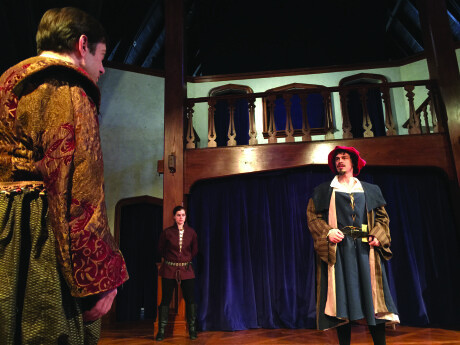In sooth I know no other way to write
my thoughts of seeing friends both here and past
bestride the open boards of a holy cockpit
to speak a muse of fire in the music of its day.
If ‘twere enough to say I was delighted
Or to praise the work of Chenault, Fogler, or Hauck
Or sing the ease of comprehension which
I soaked in ‘riginal pronunciation
Or if my heart could be contented
Only to mention our fallen comrade
Then would I write well done and friend adieu
But there is more my mortal hands must pen
A heavy burden lies on this reviewer, one that puts me in a poetic mind, as I sit enjoying and reflecting at this production of Shakespeare’s complex exploration of race, law, and love, told to audiences in the best approximation of early seventeenth-century English dialect. With help from scholar/actors David and Ben Crystal, Director Tom Delise has delivered on the Factory’s promise to present a historic production “the way it sounded in Shakespeare’s time.”

What is most surprising about OP is how quickly one’s ear adjusts to the sound, nearly as quickly as one adjusts to the sound of Elizabethan verse in general. It is essentially the same game of listening as attending any poetic drama; a game worth playing that unpacks lines stuffed with high thinking on the nature of loyalty and love, brutal observations on societal and individual corruption, and the ubiquitous mix of verbal puns and dirty jokes.

Yet a shadow lies over this production that cannot be ignored: the untimely passing of the Factory’s own Christopher Ryder, musician, actor, and friend to so many, less than two weeks before he was to perform in Merchant. The production is a tribute to the memory of one whose like, in the words of the Bard himself, will not come again, never, never, never, never, never.
The Baltimore Shakespeare Factory does the poet of Stratford-on-Avon proud with its rhetorically focused approach to production. Universal lighting, character-specific historically suggestive costumes, minimal props and scenery, and direct audience address mandate the game of listening. April Forrer’s costumes, for instance, are there to serve the text, clarifying the difference between Lonnie Simmons as the Prince of Morocco and Simmons as the Duke of Venice. Many are beautifully decorated and thoughtful, such as the broad-shouldered cape for Chris Cotterman’s Bassanio, but like all other production elements, they are means to ends. No innovative production elements or interpretive staging will guide the spectator’s comprehension, who must rely on the meticulous work of the actors in delivering the rhetorical elements of the verse.
The performances make all shows at the Factory what they are, and this is one of the Factory’s best ensembles. The company delivers complicated scenes that blend tragedy and romance. The trial scene, in which the Jewish Shylock demands his “pound of flesh” from his Christian enemy, Antonio, includes Shylock dismissing a dozen pleas for mercy, Shylock himself nearly falling to the vengeance of the state, and the cold stripping of Shylock’s faith from him under the weight of judgement, while also including a playful trick, when Portia in the guise of a lawyer, moments after saving Antonio from death, demands her own wedding ring as payment for her services.

From Zach Brewster-Geisz cynical, wounded performance as Shylock’s victim, to Ian Blackwell Rogers cold and legalistic delivery (“The pound of flesh which I demand of him is dearly bought … ‘tis mine and I will have it” is devoid of any anger and seems the honest certainty of a man finalizing a business transaction), to Katharine Vary’s scene-stealing performance of Launcelot Globbe, the characters are presented with nearly absolute fidelity to the text.
Emily Sucher’s Jessica reveals no regret at having robbed her father to run away with the Christian Lorenzo (Brendan Edward Kennedy). Portia and Nerissa, performed by Valerie Dowdle and Kathryn Zoerb, respectively, seem to enjoy their gaming on everyone from their new husbands to the failed suitor, The Prince of Arragon (played with delightful ostentation by Tegan Williams).
The commitment of the cast to the text as presented in OP is to be credited, for there are nearly no moments of irony. One possible exception is the tender connection between Dowdle and Simmons, when Portia witnesses the Prince of Morocco losing his bid for her hand. Dowdle seems on the verge of tears as she speaks the heartless line “Let all of his complexion choose me thus.” Chris Cotterman as Bassanio is the most conflicted about his own actions, first that his love for Portia may cost him the life of his dearest friend Antonio, and later when the doctor of law (his wife in disguise) asks for his ring as thanks for saving Antonio.
Most characters are not conflicted, however, as this is really a play about the struggles between groups of people in a racially and socioculturally mixed world (which is why it is set in the Venice of old). Thus, even the weighty Antonio already knows both why he hates Shylock and why Shylock hates him (Antonio tries to rescue those who are in danger of defaulting on loans and that undermines Shylock’s profits), and has made his peace with their feud long ago. In the midst of her character physicality and hilarious bits, even Vary as Launcelot reminds the audience that he hates the Jew his master and only works for him out of loyalty.
The original pronunciation is a challenge to both the actors and the spectators. However, the time and research it takes to learn, and the effort it takes to accustom oneself to it, are well worth it. For only this approach truly unearths the most honest reading of this challenging play. It has a long history of attempts to fix it, from productions where Shylock is a clown to productions where he is a bitter victim of racial oppression (even sporting the badge of the Venetian ghetto).
What this production shows is that Shakespeare saw something in the world that often gets lost in analysis of social conflict. Human beings are in all places and all times, regardless of individual or group identity, driven by their own desires. The law, love, marriage, trade, contracts, or even Anti-Semitism are used by those to accelerate their own advantage.

By presenting the play with the most honest portrayal of the text possible, with minimal production glitz to interfere, in the closest approximation of the sounds Shakespeare himself was writing for, this core message about our deep humanity, with all its flaws, is showcased at The Baltimore Shakespeare Factory in a production that no one should miss.
Running Time: Two and half hours, with a 15-minute intermission.
The Merchant of Venice plays through April 25, 2015 at The Baltimore Shakespeare Factory performing at St. Mary’s Church and Outreach Center – 3900 Roland Avenue, in Baltimore, MD. For tickets, purchase them online.
LINKS:
Baltimore Shakespeare Factory’s ‘Original Pronunciation’ Production of ‘The Merchant of Venice’ Opens Tomorrow by Lynne Menefee, Public Relations Director at Baltimore Shakespeare Factory.
David Crystal’s Original Pronunciation website.
RATING:




